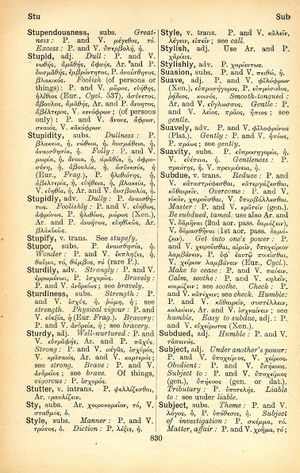suave: Difference between revisions
From LSJ
Δέσποινα γὰρ γέροντι νυμφίῳ γυνή → Mulier fit domina sponso, simulac senuerit → Die Frau beherrscht, sobald er alt, den Bräutigam
(6_15) |
(D_8) |
||
| Line 10: | Line 10: | ||
{{Lewis | {{Lewis | ||
|lshtext=<b>suāve</b>: adverb., v. [[suavis]], I. | |lshtext=<b>suāve</b>: adverb., v. [[suavis]], I. | ||
}} | |||
{{Gaffiot | |||
|gf=<b>suāvĕ</b>¹⁴ ([[suavis]]), n. pris adv<sup>t</sup>, agréablement : Hor. S. 1, 4, 76 ; Virg. B. 3, 63 ; 4, 43. | |||
}} | }} | ||
Revision as of 07:05, 14 August 2017
English > Greek (Woodhouse)
adj.
P. and V. φιλόφρων (Xen.), εὐπροσήγορος, P. εὐπρόσοδος, ῥᾴδιος, κοινός.
Smooth-tongued: Ar. and V. εὔγλωσσος.
Gentle: P. and V. λεῖος, πρᾶος, ἤπιος; see gentle.
Latin > English (Lewis & Short)
suāve: adverb., v. suavis, I.
Latin > French (Gaffiot 2016)
suāvĕ¹⁴ (suavis), n. pris advt, agréablement : Hor. S. 1, 4, 76 ; Virg. B. 3, 63 ; 4, 43.

